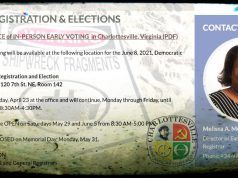by Mark Fitzgibbons
 Localities have responded with their opinions of the potential financial impact of HB 1219 (the Commission on Local Government Fiscal Impact Study (“FIS”), January 28, 2014). HB 1219 was introduced by Delegate Bob Marshall, and provides remedies for when localities abuse zoning (land use) ordinances to violate constitutional rights.
Localities have responded with their opinions of the potential financial impact of HB 1219 (the Commission on Local Government Fiscal Impact Study (“FIS”), January 28, 2014). HB 1219 was introduced by Delegate Bob Marshall, and provides remedies for when localities abuse zoning (land use) ordinances to violate constitutional rights.
Zoning is an awesome power that gives local governments control over our most basic, personal and private property decisions. Zoning power is already known to be abusive, invasive and intrusive in many instances, and as the United States Supreme Court ruled last year in the Koontz decision, has been abused to create extortive conditions in some localities. Most abuses of zoning laws by local governments are never reported because people lack resources to challenge them, or are fearful of more unfair treatment, abuse or retribution by their local governments.
The remedies under HB 1219 are:
- Equal to the amount of fines that the locality sought to unconstitutionally impose on the property owner, plus out-of-pocket damages including legal fees. Therefore, the remedies have exactly the same financial impact on the locality that it would impose on its victims;
- Only for willful (intentional) violations, as distinguished from bad judgment, local officials would have personal liability, and the local government’s penalties are increased, which is consistent with much precedent such as 42 USC 1983 and 1988;
- Ordinances that violate constitutional rights or unreasonably restrict those rights are null and void.
HB 1219 gives whistleblower protections to county employees who report violations of the law. HB 1219 reverses a ghastly 1981 Virginia Supreme Court decision giving local ordinances a presumption that they are constitutionally valid, even though local ordinances are not enacted through the constitutional structure of two legislative chambers and a threat of executive veto. This change levels the playing field because the locality now bears the burden on the enforcement it seeks to impose on the citizen – consistent with the American rule of law of innocent until proven guilty.
If the costs for their unlawful acts are hard for localities to swallow, then how could – and why should – individual land owners absorb such costs? This is a remedies bill of parity and fairness. Plus, as one county supervisor was overheard saying when another said that a proposed ordinance would lead to litigation, “That’s what (county litigation) insurance is for.” How irresponsible is that?
The localities’ objections to HB 1219 based on potential costs show an incredible insensitivity to the victims of local abuse, and actually prove the need for HB 1219. HB 1219 will force localities to be more attentive, which will reduce the need for litigation.
Just as citizens face consequences when they do not follow the law – which is further incentive to follow the law – HB 1219 imposes consequences of local government.
Here are responses to the statements in the FIS:
Rappahannock claims personal liability will reduce staff’s willingness to enforce out of fear. First, staff liability occurs only for intentional violations, not errors in judgement. Secondly, 42 USC 1983 is precedent, and it doesn’t result in reduced proper enforcement of the law.
Rockingham cites fear that claims won’t be covered by insurance. Well, property owners do not generally have litigation insurance to cover when counties overreach and violate constitutional rights in zoning enforcement.
City of Chesapeake complains about the loss of the presumption of validity, and about personal liability. Again, there is personal liability only for intentional violations. And why should citizens bear the burden of proof when the acts at issue are those of the locality?
City Lynchburg says HB 1219 will encourage lawsuits. Only under the standards of the law would citizens be able to sue, and any frivolous lawsuits would be quickly dismissed. Put another way, the current lack of liability for localities “encourages” unconstitutional enforcement against citizens.
Lynchburg says “unreasonable restriction on the free exercise of rights” is vague. Hey, that’s the same word standard used by localities to regulate us in many instances. Good for the goose . . . BUT, the term “unreasonable restriction” on rights is a term that has been addressed in many Supreme Court decisions, so it is a verifiable standard.
City of Norfolk claims that the burden of proof on localities will make it more difficult for them to defend actions in court. Agreed. These suits would be the result of localities initiating enforcement actions in violation of the Constitution, so the locality should have the burden.
City of Poquoson says they would not knowingly pass a law that violates the Constitution. Very good, City of Poquoson! However, what locality would admit to knowingly passing a law that violates the Constitution? (“Yes, my dear stupid constituents, we passed this ordinance that we know violates the Fourth Amendment just because we can.”)
The Conclusion of the FIS states that “Financial hardship from awards of damages could be crippling.” Welcome to the world that citizens face.
The Conclusion also states, “Local government lawyers may need to spend more time reviewing land use decisions in order to avoid future litigation.” Yes! This legislation is intended to prevent litigation whenever possible. It starts with making localities actually try to NOT violate rights. If that is a novel concept for localities, then it merely further proves the need for HB 1219.







